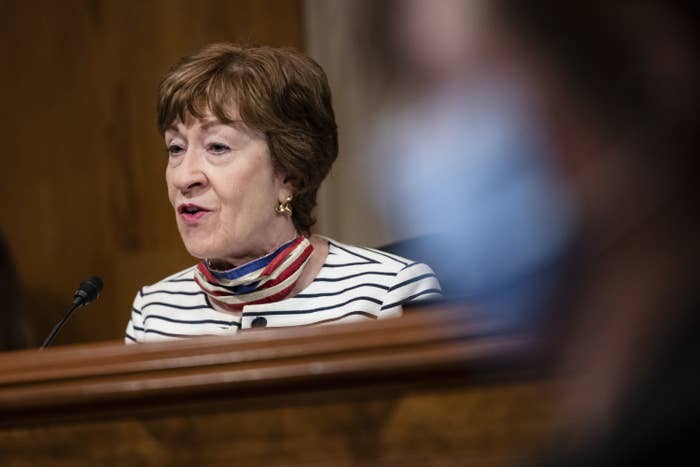
WASHINGTON — Sen. Susan Collins said Saturday she will not vote to replace Justice Ruth Bader Ginsburg on the Supreme Court until after Election Day.
Collins, a Maine Republican who is in a tight reelection race, said in a statement that whoever wins the presidential election should choose the nominee to replace Ginsburg, “in fairness to the American people.”
Collins did say that President Donald Trump “has the constitutional authority” to nominate a candidate of his choice in the meantime and she said she supports the Senate Judiciary Committee, of which she is a member, beginning the process of vetting that nominee.
“Given the proximity of the presidential election, however, I do not believe that the Senate should vote on the nominee prior to the election,” she said.
My statement on the Supreme Court vacancy:
Republicans will face a complicated decision in the coming weeks over whether to potentially rush a confirmation before the election, or whether to vote on a new Supreme Court nominee during their lame-duck session, which runs from the election through January, when newly elected senators are seated, and perhaps a new president takes office.
Republicans have 53 votes in the Senate; four would need to vote against confirmation for it to fail if all Democrats vote together. If the Senate ties on a nominee, Vice President Mike Pence would need to break it.
Collins is the first Republican to say that they would oppose confirming a Trump nominee to the Supreme Court before the election since Ginsburg’s death was announced on Friday. But other Republican senators have said previously that the Senate should wait, most prominently Alaska Sen. Lisa Murkowski.
Murkowski told a reporter on Friday before the announcement of Ginsburg’s death that she would not vote for a new Supreme Court justice before the election, saying, “Fair is fair.” On Aug. 3, the senator from Alaska said it would be a “double standard” to fill a vacancy before the November election adding that she “would not support it.”
Murkowski is not up for reelection in 2020, but in 2018 she was the only Republican senator to oppose Supreme Court Justice Brett Kavanaugh’s Senate confirmation.
Sen. Chuck Grassley also reportedly said before Ginsburg’s death that he would not support confirming a justice prior to the election. Grassley told NBC News in August that “he couldn’t move forward with it,” saying it would backtrack his 2016 position of blocking then-president Barack Obama’s nominee, Merrick Garland.
Colorado Sen. Cory Gardner, who is also locked in a complicated reelection campaign, has not yet commented on the timing of a vote. Other Republicans in tight campaigns, such as Arizona’s Martha McSally and North Carolina’s Thom Tillis, have said they support moving forward with a nomination.
Trump announced 20 new potential Supreme Court picks just last week, including three Republican colleagues of Collins’ — Sens. Tom Cotton, Ted Cruz, and Josh Hawley. The latter, Hawley, said he would not accept the nomination.
Senate Majority Leader Mitch McConnell confirmed Friday night he would move forward with a vote on whoever Trump nominates, despite famously staving off the Garland nomination in 2016.


